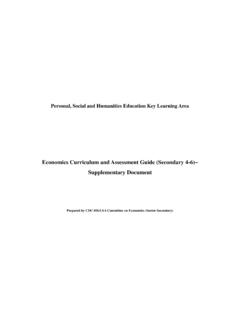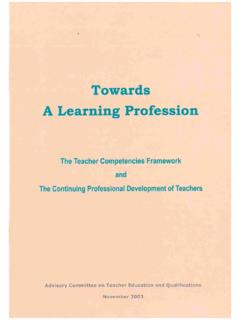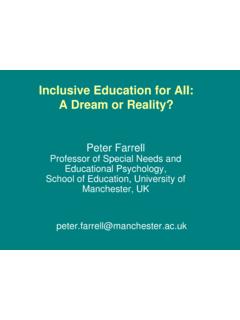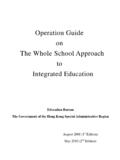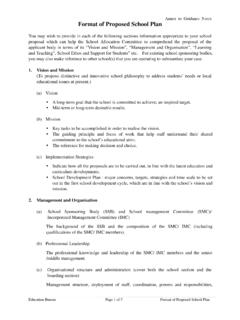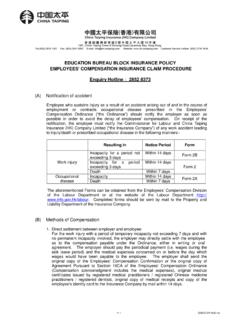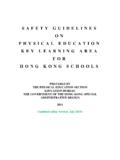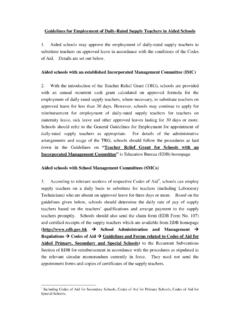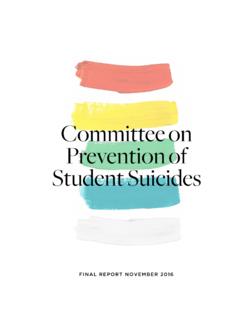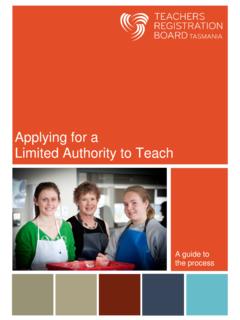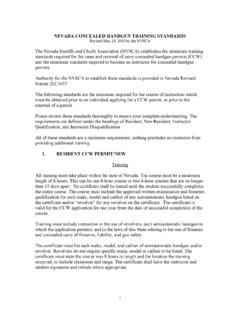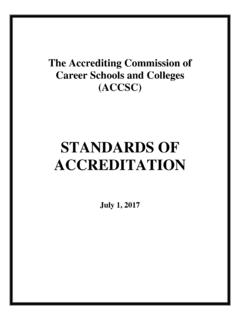Transcription of Curriculum Development Council November 2015
1 Curriculum Development CouncilNovember 2015 What is STEM Education? STEM Science, Technology, Engineering and Mathematics Introduced in 1990s by the National Science Foundation, USA, now variously used for initiatives in education, industry, economy, of STEM education To strengthen the Science, Technology and Mathematics Education to nurture diversified talentswith different capabilities and at different levels in the science and technology fields for enhancing the international competitiveness of approachesSuiting the needs and interests of learning experiencesSTEM-related learning opportunitiesaspartoftheessentiallearnin gexperiences (that include those beyond classroom) among different purposes, views and interestsWith considerations of students interests & needs, teachers viewsand partnerships with community on strengthsBuilding on school experiences and other conducive factors, such asflexible use of learning time, life-wide learning experiences, Development processA dynamic improving processReference has been made to the local, the Mainland and international experiences, the current education trends as well as ongoing renewal of school Curriculum , in response to macro changing social, economic and demographic contexts.
2 To develop among students a solid knowledge baseand to enhance their interests inScience, Technology and Mathematicsfor further studies and careersin meeting the changes and challenges in the contemporary world To strengthen students ability to integrate and apply knowledge and skills, and to nurture students creativity, collaboration and problem solving skills, as well as to foster their innovation as required in the 21st century To strengthen the professional capacityofand collaboration among teachersin schools and the partnershipswith community stakeholders To nurture talents and develop experts in STEM areas so as to contribute to the Development of Hong Kong and the & ApplyKnowledgeAttitudesSkillsSE KLATE KLAME KLAA pproaches for STEM Learning Activities Approach One Learning activities based on a topic of a KLASE KLATE KLAME KLAG enetic CodeScience EducationScience EducationStructure of DNAM odel DesignTechnology EducationModel MakingRatioMathematics EducationMeasuringPicture Source.
3 Nature EducationDNA Model MakingRubber Band Powered CarGeneral StudiesGeneral StudiesEnergySpeedMathematics Education Mathematics Education Design and build modelsMeasurement by GPS Tracking Apps and Investigating the Errors of MeasurementGPS tracking apps Technology Education Technology Education Using tablet computersEstimationMathematics EducationMathematics EducationErrorsScience EducationScience EducationRate and ratioApproach TwoProjects integrating relevant learning elements of different KLAs ME KLATE KLASE KLAFoodPyramidScience EducationScience EducationFood SubstancesTechnology EducationTechnology EducationFood Preparation Food HygieneCollect and organise dataMathematics EducationEstimate and measureHealthy Diet Design menu Design mobile application for calculating calorie value Food research and developmentFood Research & Development4. Enhance professional Development of schools and teachers2.
4 Enrich learning activities for students1. Renew curricula3. Provide learning and teaching resources5. Strengthen partnerships with community key players6. Conduct reviews and disseminate good practicesUpdate Curriculum Framework Update Science (Secondary 1-3) Curriculum ( on area of life science) Further strengthen theapplications of scienceand therelevance of science to daily life contexts Promote pedagogies facilitating students to integrate and apply knowledge and skills ( scientific investigation,problem-based learning, design-and-make activities)Update Curriculum Framework (Secondary 1-3) Ensureat least 30% of Curriculum time under ICT to teach programming concepts (including coding) Coversix knowledge contexts, namely ICT, Materials & Structures, Operations & Manufacturing, Strategies & Management, Systems & Control, and Technology & Living are grouped into 16 core and 10 extension modules to ensure students to acquire common and concrete knowledge base All schools are recommended to offer core modules with 8% of the Curriculum time(4 periods per 6-day cycle).
5 Some schools - offer extension modules to meet different needs of students (up to 15% of the Curriculum time) Promotetheme-based, design-and-make learning activities to enhance integration and application of knowledge and skills through project learning among students Cultivate students interest and curiosity through hands-on and minds-on STEM-related activities, allowing students to solve problems and create new solutions for the well-being of humankindUpdate Curriculum Framework Holistic and multi-stage review of Mathematics Curriculum (P1-S6) To address the issues like enhancing vertical continuity/progression in mathslearning, lateral alignment with other KLAs, STEM education, and incorporation of elements of ongoing Curriculum renewal Fine-tune learning and teaching sequence Strengthen the learning and teaching of Data Handling andProbability,so as to develop students ability to make informed decision based on calculated risk.
6 Promote project learning, mathematical modeling, and problem-based learningto strengthen the ability to integrate and apply knowledge and skills, and make calculated judgmentRemarks: Updates of Curriculum content of Mathematics for P1-S3 (2016) Updates of Curriculum content of Mathematics for S4-S6 (2017)Update Curriculum Framework Update Curriculum contents ( low carbon living, global warming) Enrich activities related to the applications of science and technology in solving everyday life problems ( energy use in daily life, the use of simple machines) Promote pedagogies for applying knowledge and skills through different learning activities ( scientific investigation, project learning) Develop students basic science process skills ( observing, measuring, classifying, communicating) Organise signature event to serve as hub Education Fair for Use effectively school-based flexible time of central time allocation / outside classroom learning for engaging students in worthwhile learning experiences ( cross-curricular and cross-KLA project learning or competitions) Broaden learning opportunities for students through their participation in local/national/international competitions and students with special talent to apply for local and overseas Develop resource packages for teachers reference, including cross-disciplinary activities, project learning ( new L&T resource packages for primary GS) e-resources( e-library, online courses, e- textbooks) for effective learning and Enrich the learning and teaching resources on EDB One-stop Portal (OSP)
7 Hosted by Promote learning and teaching resources and life-wide learning activities provided by various organisations ( HK Science Park, HK Science Museum)AFCD Lions Nature Education CentreHong Kong ObservatoryHong Kong Space MuseumHong Kong Wetland ParkAviation Discovery CentreCaritas Chan Chun Ha Field Studies Centre Ho Koon Nature Education cum Astronomical CentreHong Kong Association for Science and Mathematics EducationHong Kong Maritime MuseumJockey Club Museum of Climate Change (MoCC)Kadoorie Farm & Botanic GardenOcean Park Academy Hong KongSik Sik Yuen Biotechnology Mobile Laboratory ProgramWWF The Mai Po Nature ReserveHong Kong Technology Education AssociationHong Kong Science MuseumArts & Technology Education CentreHong Kong Science & Technology ParksHong Kong Productivity CouncilThe Hong Kong Academy of Gifted EducationThe Young Entrepreneurs Development CouncilThe Hong Kong Institute of EducationThe Chinese University of Hong KongThe University of Hong KongHong Kong Institute of Vocational EducationHong Kong Baptist UniversityCity University of Hong KongCity GalleryThe Hong Kong University of Science and TechnologyAirport Authority Hong KongMTR Corporation LimitedThe Hong Kong Polytechnic UniversityHong Kong New Generation Cultural AssociationBritish CouncilHong KongHong Kong Federation of Youth GroupsNon-government
8 OrganisationGovernment and Related Organiseevent to serve as hub -Symposia for school heads and Curriculum Organise PDPs for middle managers and teachers of ALL primary and secondary schools in the coming three years[ ] Build learning communities to enhance knowledge exchange ( Professional Development Schools (PDS) Scheme and QEF Thematic Network (QTN) ) Enhance teachers exposure to cutting edge Development in science and technology fields through exchange with academics/partners in the territory and from the Mainland and overseasSTEM Education CommunityEDB and Curriculum Advisory CommitteesPrimary and Secondary SchoolsProfessional Bodies ( HKASME, HKTEA, HKIE)Other Government Departments / Government-related OrganisationsNon-Government OrganisationsTertiary research and evaluation studies on the implementation and review the curricula as appropriate good practices and consolidate evidence-based practices through PDPs, Centre of Excellence (CoE) ( PDS of Education Development Fund) STEM Education project learning as a means to nurture creativity, innovation, collaboration and problem solving skills, and entrepreneurial spirit Information Literacy effective and ethical use of information Language across the Curriculum (LaC) /Reading across the Curriculum (RaC)
9 Including effective communication of innovative ideas Refined Generic Skills basic skills, thinking skills, personal and social skills Values Education nurturing positive values and attitudes solving authentic problems to improve living and contribute to society and the nationEDB Website> Curriculum Development >Topic Highlights>Ongoing Renewal of the School CurriculumURL address: Curriculum GuidesConsultation BeginsConsultationEndsAnnouncementSTEM Education (SE, TE, ME) 5 & 6 Nov 2015(SE - 9 & 25 Nov )(TE 20 & 30 Nov) (ME - 10, 11, 23 & 26 Nov) 4 Jan 2016 mid 2016 Primary General Studies Feb 2016 Mar 2016 late Jun 2016 Promotion of STEM Educationisan Ongoing DevelopmentcollaboratingThank You

